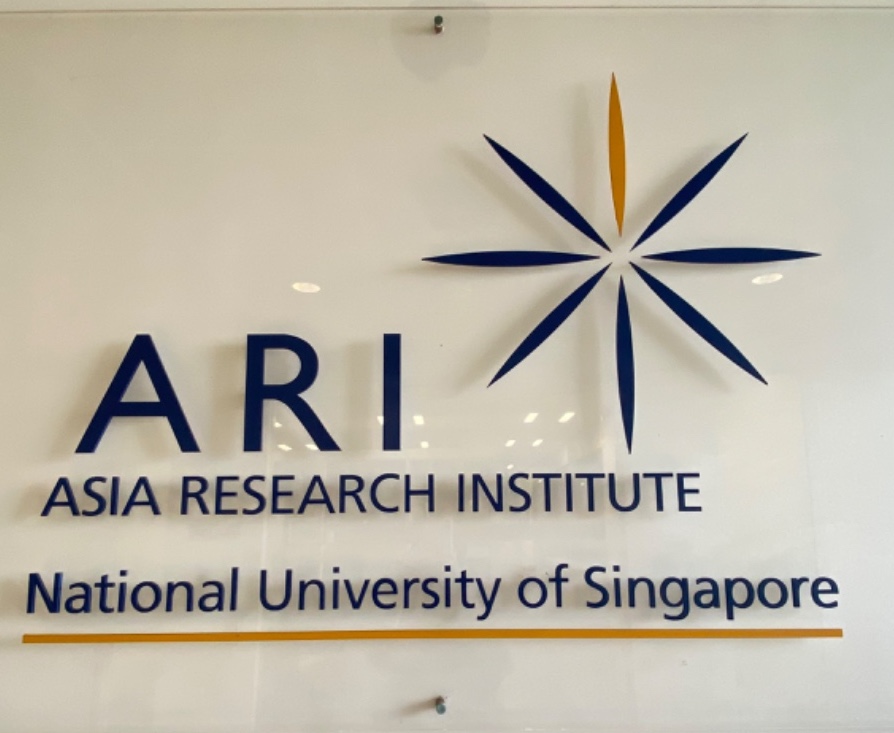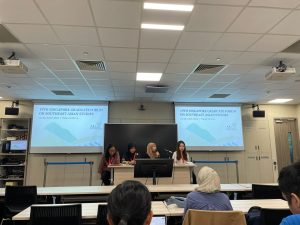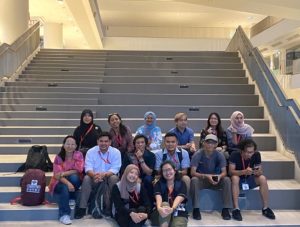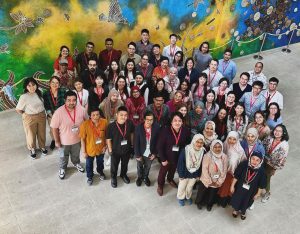
The sentence, “Whatever Bourdieu says, whatever Foucault says, or whatever everyone says, if you have a certain thought and it’s good, just do it!” was spoken by my discussant, Dr. Maznah Mohamad, after my presentation at the 19th Singapore Graduate Forum on Southeast Asian Studies, Asia Research Institute, National University of Singapore (ARI-NUS), held from June 18-28, 2024. This statement reminded me of my past decolonial classes. “Decolonial” indeed became a sort of highlight at this ARI-NUS event. Fresh decolonial projects were showcased by several participants from various countries attending this event. In the ARI-NUS 2024 program, the Cultural and Media Studies Program, Universitas Gadjah Mada (KBM UGM), had two students participating, one from the Master’s level (Laillia Dhiah Indriani) and one from the Doctoral level (Moch. Zainul Arifin).
ARI-NUS 2024 consisted of two series of activities, namely a masterclass held on June 18-25, 2024, in a hybrid format, followed by a conference on June 26-28, 2024, held in person at NUS. This forum brought together scholars from various countries with an interest in Southeast Asian Studies from different disciplines, including social sciences, religion, gender, culture, and even health. Through the meetings at this forum, I was led to a self-reflection in the academic world. Here are some important points I gained from this forum:

Not all researchers can “set their foots on the ground”
An interesting discussion occurred when some participants gathered while enjoying lunch. We had just listened to a sharing session from an academic with outstanding publications. “The research was excellent, but it didn’t set foot on the ground,” said one participant. The term “set foot on the ground” in this context refers to how a piece of research does not consider the side effects of the development projects it proposes. They design various things with a focus on improving the future but forget vulnerable groups. This discussion led me to reflect on how KBM UGM always emphasizes its students to intersect when conducting research.

The “gender” perspective is still very rarely mastered by scholars
The “gender perspective” had its own session at ARI-NUS this time. There was even a special “gender” panel in which I was one of the participants. After this “gender perspective” session, many participants said, “I never used this gender perspective before.” “I teach methodology, but usually focus on how to do the methodology. I just found out that the gender perspective is very important.” Similar responses were given by discussants in the gender panel, saying, “All talk about women, but gender is not just about women. Only two of the presenters at this time used a gender point of view, both from Indonesia, Laili and Utari.”
Through these responses, I realized that building a gender perspective is not easy and cannot be done quickly, even by senior researchers. This is a valuable lesson for me, who has an interest in research in this field, to continue honing that perspective.
The special gender forum created by ARI-NUS is very good for building awareness about how to respond to something in society that is often designed from a male perspective.

Decolonial Projects and Chinese Studies are strengthening
One very interesting thing when attending this forum is that I found an awareness to build new knowledge and decolonize an established system resulting from colonialism is increasingly felt. It is interesting when researchers from the Philippines raised the issue of traditional medicine, researchers from Malaysia talked about race and Malay ethnicity, and many more. Formerly colonized countries in Southeast Asia have begun to realize that colonialism has erased much local heritage and it is felt important to reawaken society to break free from the shadows of colonialism.
Besides the rampant decolonial projects, I also noticed that Chinese Studies is now becoming a popular field of study. A few years ago, there were many studies about America, with some universities even opening “American Studies” programs.
At the 19th Singapore Graduate Forum on Southeast Asian Studies, ARI-NUS 2024, for example, many studies discussed China, from its economy, history, language, and culture. The numerous studies about China made me realize one thing: China has now dominated various important sectors of life. People are no longer interested in America and “Western-centric” views but are shifting towards Asian countries, especially China.
Author: Laillia Dhiah Indriani
Photo: Laillia Dhiah Indriani
SDG 4, SDG 17
